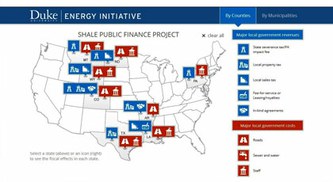
Researchers from the Duke University Energy Initiative gathered data from communities surrounding 10 oil and gas plays to determine the net outcome of increased revenue and service demand costs in these regions.
Shale development has played a major role in the economics of the country, especially for local governments. In shale play regions, county and municipal governments have experienced increased revenue from a variety of sources, such as severance taxes and impact fees, local property taxes and sales taxes, direct payments from oil and gas companies such as fee for services or lease payments, and in-kind contributions from industry.
Increased expenses for services such as road maintenance, increased staffing needs and sewer and water infrastructure are issues faced by local government. Researchers Daniel Raimi and Richard Newell with the Duke University Energy Initiative looked at these oil- and gas-related revenues and service demands for local governments in Arkansas, Colorado, Louisiana, Montana, North Dakota, Pennsylvania, Texas and Wyoming. They determined most county and municipal governments have experienced net financial benefits, though some in western North Dakota and eastern Montana appear to have experienced net negative fiscal impacts at this stage in development.
Revenue resources can vary from state to state due to what revenue instruments are employed in each state, thus the 90-page paper reviews each state by shale play. Overall, the research shows the net impact of shale development has generally been positive for local public finances.
Increased costs from new service demands have generally been outweighed or kept pace with increased revenues from a variety of sources, allowing local governments to maintain and in some cases expand or improve the services they provide. Some local governments have worked proactively with industry for road maintenance agreements and improvements, thus limiting public costs.
Many local governments in the Bakken region have experienced net negative fiscal effects at this height in drilling and hydraulic fracturing activities, while some municipalities in very rural parts of Colorado and Wyoming initially struggled to manage rapid population growth, but these challenges subsided as drilling activity slowed.
The complete report can be found on the Duke University’s Shale Public Finance Web site.